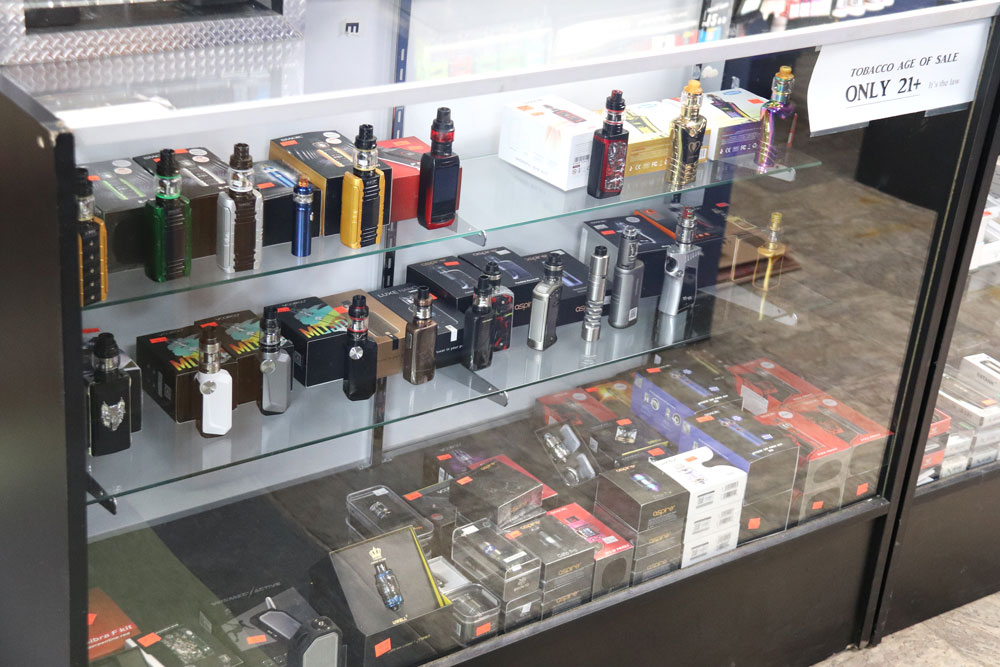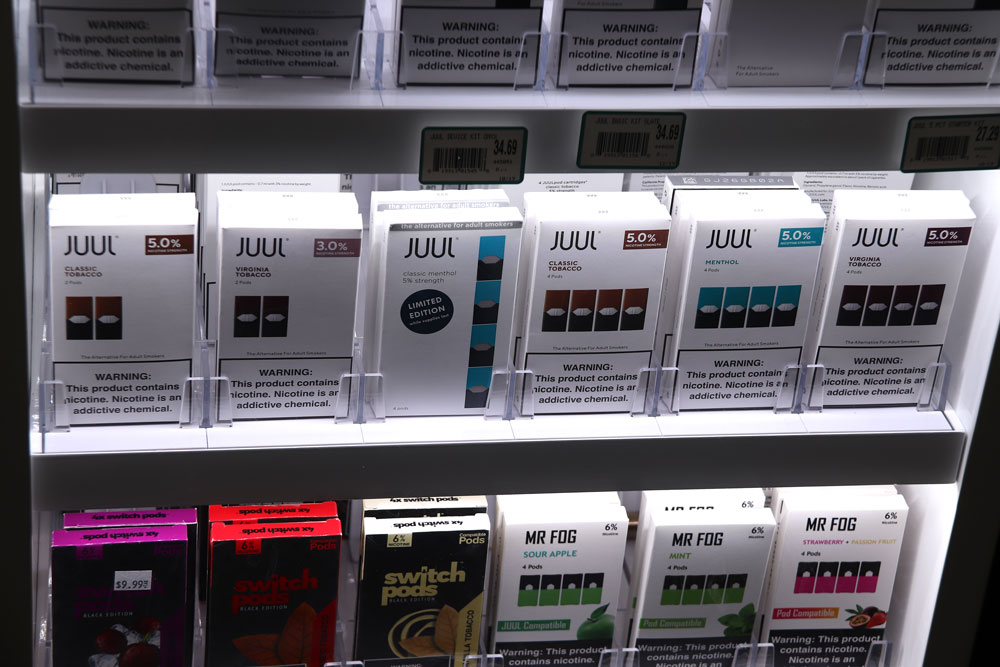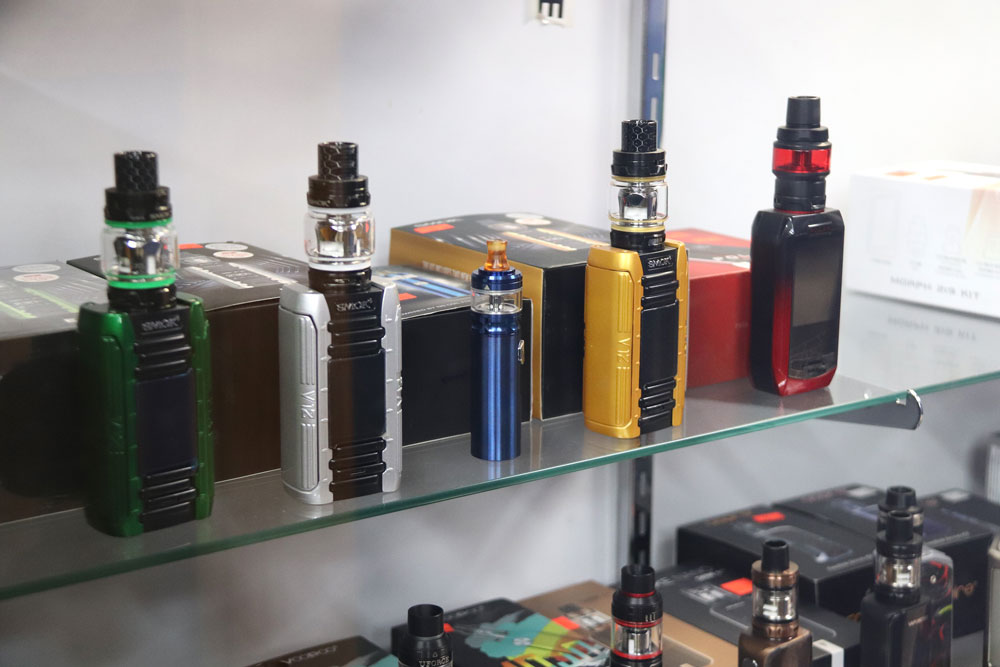New federal tobacco law causes questions
By Kelly Terpstra, kterpstra@charlescitypress.com
Alcohol sales were steady Tuesday afternoon at Rush Stop convenience store on South Main Street in Charles City.
Customers were in a New Year’s Eve party mood as 12-packs of beer and bottles of liquor were placed on the counter for purchase.
But there was one noticeable exception – anyone under 21 purchasing tobacco products.
A federal law was passed by Congress and signed by President Donald Trump on Dec. 20 that prohibits the sale of tobacco products to anyone under the age of 21.
The law is now in effect in all 50 states. The Food and Drug Administration has yet to finalize the federal Tobacco 21 law, but for stores like Rush Stop, their bottom line is already taking a hit.
Rush Stop independent store owner Gulfam Baig said the first day after he posted signs in his store informing his customers that any tobacco-related products would not be sold to anyone under 21, his sales dropped.
Rush Stop sells tobacco, cigarettes, vaping devices, glass pipes and the e-liquid that is used in electronic smoking devices. None of that now is allowed to be sold to customers under 21.
Baig said his sales dropped over the weekend from $3,500 this past Saturday to around $2,200 on Sunday. Those retail sales do not include gas purchases from the pump. Baig also said he lost $500 in cigarette sales in a two-hour timeframe one day after denying sales to 11 or 12 customers under the age of 21.
“I was so surprised,” said Baig, who also owns convenience stores in Marshalltown and Dubuque.
Baig said customers that come in to purchase tobacco-related items also buy other merchandise from the store, which affects his bottom line in sales.
He said many of the tobacco items he has for sale cannot be returned and he is lowering the price on many of the in-stock goods because of expiration dates.
“We’re trying to recover our money,” he said.
He also said he will probably have to scale back on his inventory of tobacco-related items.
“Anything related to nicotine they can’t buy. I got the email from the company on Saturday and put the signs everywhere,” said Baig.
“The customers were really upset,” he said. “I said, ‘We can’t do nothing. It’s a federal law and we abide by the law.’ There is no grandfather law as well.”
In the 1980s when the drinking age was raised from 18 to 21, persons who had already reached a legal age were allowed to continue to purchase alcohol even as the age limit was increased. That did not apply this time to the tobacco change.
Warren Krieg, a cashier at Rush Stop who has been working at the store for about nine months, said Baig informed the three full-time and two part-time employees about the law last week.
“He sat down and talked to all of us individually,” said Krieg, age 24.
“A lot of people weren’t even aware of it. It just kind of caught them all off guard,” said Krieg. “When it was the first couple days they were not believing it. I told them, ‘do your research.’”
Prior to passage of the new federal law, 16 states had approved raising the age to purchase tobacco products. Several vaping-related deaths in young adults as well as an effort to improve the overall health of the nation’s population were stated as driving forces to create the new legislation.
Plus, nicotine, one of the active ingredients in tobacco, has proven to be highly addictive.
“It’s more addictive than heroin. It’s just really hard to quit,” said Marly Behm, 46, of Charles City.
Behm said she still smokes and has for 32 years.
“I used to sneak my daddy’s cigarettes when I was a kid,” she said.
Along with her husband, Fred Behm, the couple has 10 kids. Thankfully, she said, none of them smoke.
“They’re all smart enough to not smoke,” said Fred, who said he started smoking when he was 21 after getting into a car accident where he broke his back.
He lost a scholarship to play football at Cal State Long Beach after the injury. He said he got depressed and picked up the habit.
He warned anyone about the dangers of smoking, especially vaping.
“The particles in the vapes are so small they will actually, literally go through five layers of paint,” said Fred. “You take that vape into your lungs, it can actually penetrate out of your lungs and into your body.”
Marly said she quit smoking for two years and then tried again a second time. That’s when the medication she was using to stop the cravings to smoke almost killed her.
“I got a heart attack from the medication,” said Behm.
Charles City Police Chief Hugh Anderson said Iowa law has not changed when it comes to the sale of tobacco products. The state still allows sale to those age 18 and older.
The federal law also does not prohibit anyone to be in possession of tobacco products or a vaping mechanism.
“Federal law does not talk about who can possess it. It talks about who can buy it,” said Anderson. “It’s going to take a little while for the states to catch up with the federal law.”
Anderson said he contacted the Iowa Department of Public Health and was told they feel the Iowa State Legislature will soon attempt to have a law in place to reflect the federal law.
If the law is changed to prohibit possession, Anderson said not much will change in terms of his force policing anyone under age that may be smoking tobacco or carrying it around.
“It would be similar to what it is now,” said Anderson. “Right now anyone under the age of 18, they can get a ticket.”
Anderson said it’s $50 fine for the first citation, $100 for a second ticket and $250 for third and subsequent offenses.
The new federal law will give young adults more time to ponder their use of tobacco and the impact it may have on their health as well as any legal issues that may arise from it, Anderson said.
“We’ve seen what the effects of tobacco have done now for years and years and years,” he said. “It’s just going to give somebody three more years to make that decision.”
Rush Stop cashier Heather Page, who was using a vaping device at the store while working, said she didn’t know if the law would have any effect on young adults that have been smoking for years before the law was passed.
“If they want it, they’re going to get it,” said Page, age 22.
She said there are already people on Facebook stating they would be willing to purchase tobacco for anyone under 21. She said those black-market prices are often double the normal price to make a profit.
“They’ll pay that and it’s not really solving the problem,” said Page.
Marly Behm agreed.
“It’s not going to change anything, they’re still going to do the same thing,” she said.

















Social Share